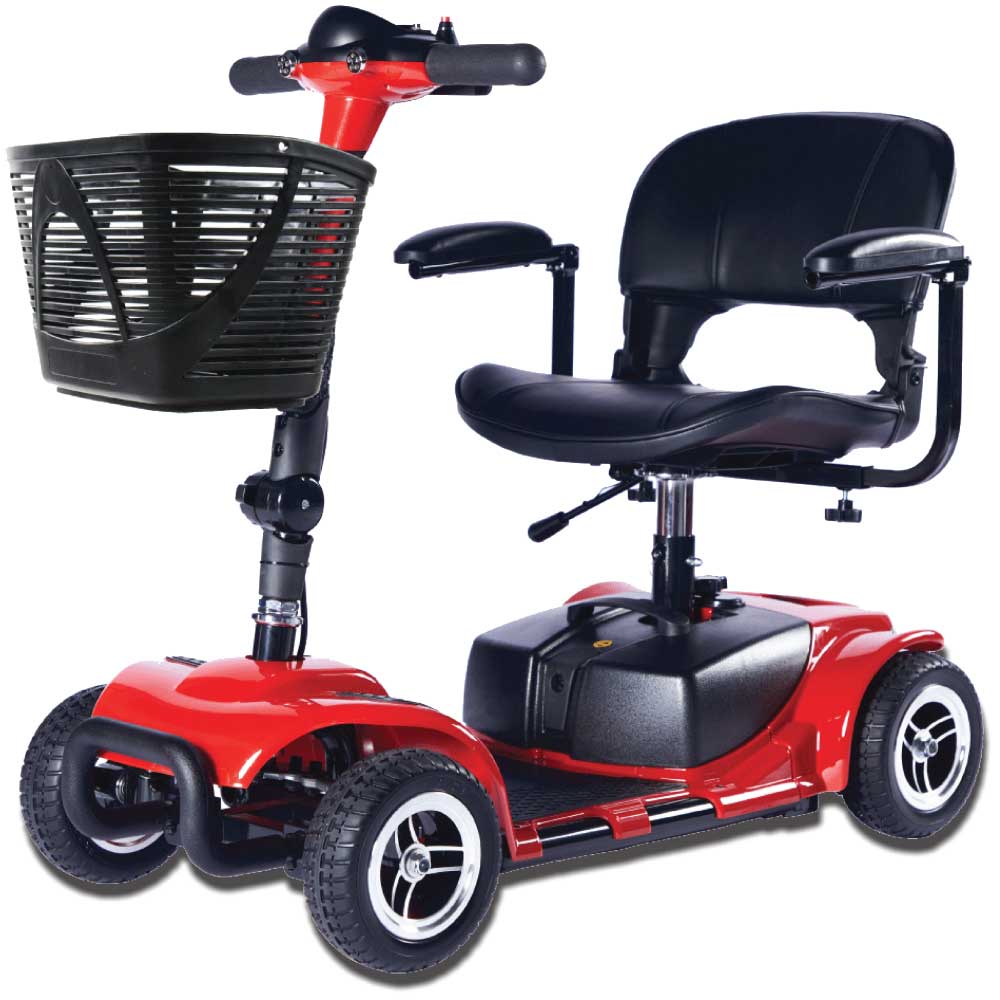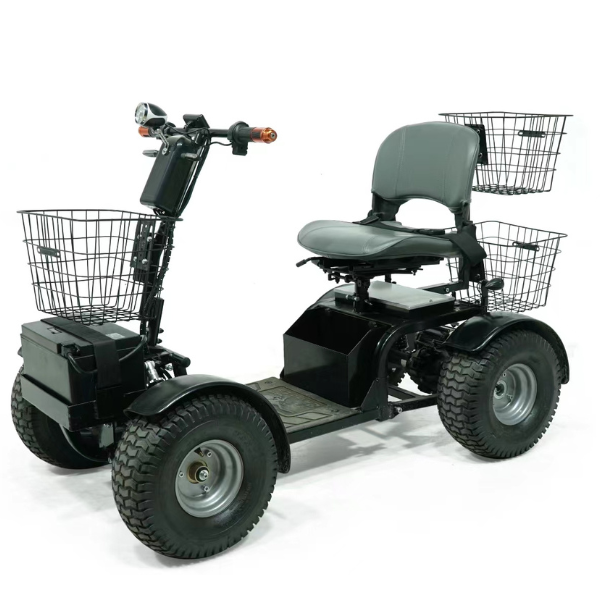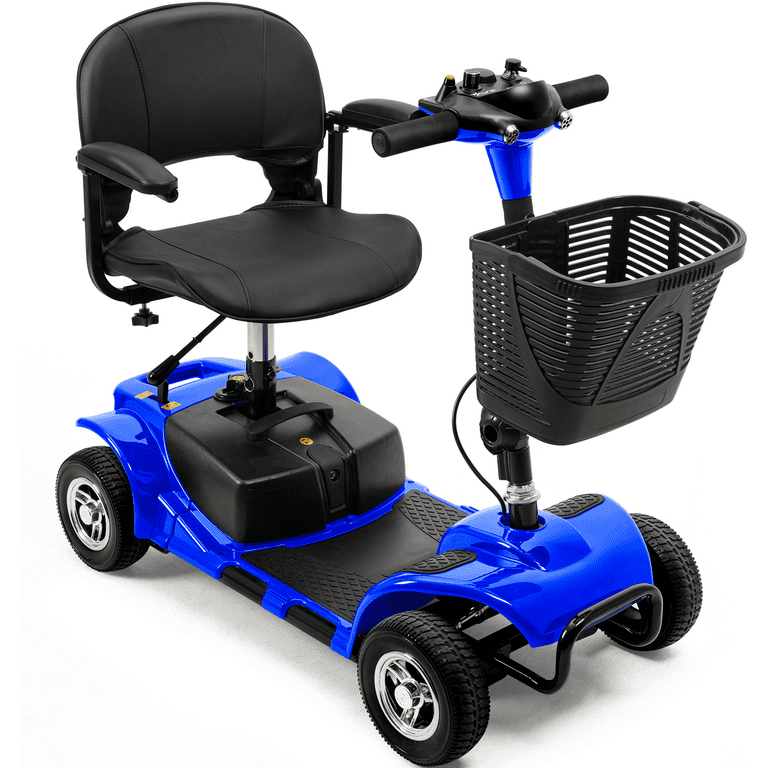Mobility scooters are better suited for individuals who can move more independently, while electric wheelchairs provide greater support for those with limited mobility. Mobility scooters tend to be more cost-effective, portable, and have a greater range, while electric wheelchairs offer precise control and maneuverability.
Additionally, electric wheelchairs require a joystick for navigation, while mobility scooters utilize a tiller and handlebars. However, both options have their disadvantages, such as the need for regular maintenance and potential difficulty in accessing certain buildings or terrains. Ultimately, the choice between a mobility scooter and an electric wheelchair depends on individual needs and preferences.

Credit: www.amazon.com
Mobility Scooters
When it comes to choosing between a mobility scooter and an electric wheelchair, it is essential to consider the specific needs and preferences of the user. Mobility scooters are designed for individuals who have a certain level of mobility and can move more freely on their own. They are particularly suitable for those who can walk short distances or stand for periods of time.
Features Of Mobility Scooters
Mobility scooters come with a range of features that enhance the user’s mobility and comfort. Some key features include:
- Throttle levers: Mobility scooters are equipped with throttle levers that allow users to control the speed and movement of the scooter.
- Battery meter: Scooters are equipped with a battery meter to indicate the remaining power and ensure the user does not run out of battery while on the go.
- Turning capabilities: Mobility scooters are designed with excellent maneuverability, allowing users to make tight turns and navigate through narrow spaces.
- Storage: Many scooters come with built-in storage compartments, baskets, or bags, providing users with a convenient space to carry personal belongings or shopping items.
Suitability For Users
Mobility scooters are well-suited for individuals who have a certain level of mobility and independence. They are ideal for users who can walk short distances or stand for periods of time but require additional support for longer journeys or when fatigue sets in.
However, it is important to consider that mobility scooters may not be suitable for individuals with severe mobility limitations, as they still require some level of physical exertion and balance to operate efficiently.
Portability And Storage
When it comes to portability and storage, mobility scooters offer various options to cater to different needs. Some scooters are foldable, allowing for easy transportation and storage in small spaces, such as car trunks or closets. Others may have detachable parts for convenient disassembly and storage.
It is essential for users to consider their storage limitations and transportation needs when choosing a mobility scooter. Additionally, the weight and size of the scooter should be taken into account, especially for users who may have difficulty lifting or maneuvering heavier models.

Credit: www.zipr.com
Electric Wheelchairs
Electric wheelchairs and mobility scooters serve different purposes. Mobility scooters are ideal for individuals who can walk and stand but need some additional support, while electric wheelchairs are better suited for those who require more assistance with their mobility. Each option has its own advantages and disadvantages, making it important to choose the right one based on individual needs and preferences.
Electric Wheelchairs
Electric wheelchairs are a popular mobility solution for individuals who require more support and assistance with their mobility. With a range of features and capabilities, electric wheelchairs offer convenience, comfort, and independence to users.
Features Of Electric Wheelchairs
Electric wheelchairs come equipped with various features that enhance the comfort and usability of the user. These features include:
1. Powered Movement: Electric wheelchairs use batteries to provide power for movement, allowing users to navigate effortlessly without exerting physical effort. This feature is especially beneficial for individuals with limited upper body strength or mobility issues.
2. Adjustable Seating: Electric wheelchairs offer adjustable seating options to ensure optimal comfort for users. These chairs typically feature adjustable seat height, backrest angle, and footrest position, allowing users to find the most comfortable and supportive position for their needs.
3. Suspension System: Some electric wheelchairs are equipped with a suspension system, which helps absorb shocks and bumps on uneven terrain. This feature provides a smoother and more comfortable ride, particularly outdoors or on rough surfaces.
4. Storage and Accessories: Many electric wheelchairs come with convenient storage options and accessories. These may include storage baskets, cup holders, and additional attachable accessories like oxygen tank holders or walker holders. These features enhance convenience and allow users to keep their belongings within reach while on the move.
Suitability For Users
Electric wheelchairs are designed to cater to individuals with various mobility needs. They are particularly suitable for:
1. Individuals with Limited Mobility: Electric wheelchairs are ideal for individuals who have limited mobility and require assistance in propelling themselves. These wheelchairs provide a safe and reliable means of transportation, allowing users to maintain their independence and freedom.
2. Those Requiring Long-Distance Travel: Electric wheelchairs are suitable for individuals who need to travel longer distances regularly. With their battery-powered propulsion, these wheelchairs offer extended range capabilities, ensuring users can travel without the need for frequent recharging.
3. Users with Specific Medical Conditions: Electric wheelchairs are often recommended for individuals with specific medical conditions, such as spinal cord injuries or muscular dystrophy. These wheelchairs provide the necessary support and mobility assistance required for daily activities and tasks.
Turning Capabilities
Electric wheelchairs offer excellent maneuverability with their turning capabilities. The turning radius is an essential factor to consider when choosing an electric wheelchair, particularly for navigating tight spaces or crowded areas.
Thanks to their compact design and advanced steering systems, electric wheelchairs can achieve a small turning radius, allowing users to maneuver easily in confined spaces such as narrow hallways or doorways. This feature ensures optimal mobility and accessibility, giving users the freedom to navigate various environments without limitations.
Joystick Controls
Electric wheelchairs utilize joystick controls, which provide users with intuitive and straightforward navigation. The joystick is typically mounted on the armrest of the wheelchair and allows users to control the direction and movement of the wheelchair with ease.
The joystick can be operated by users with limited dexterity or strength, as it requires minimal effort and coordination. This control mechanism offers precise and responsive movement, ensuring a smooth and seamless user experience.
In conclusion, electric wheelchairs offer a range of features and capabilities that make them a suitable mobility solution for individuals with diverse needs. With their adjustable seating, advanced turning capabilities, and user-friendly joystick controls, electric wheelchairs provide users with both comfort and independence in their daily lives.
Pros And Cons Of Mobility Scooters Vs Electric Wheelchairs
When it comes to choosing between a mobility scooter and an electric wheelchair, it’s important to consider the pros and cons of each option. Both devices offer mobility and independence to individuals with mobility limitations, but they do have their differences. In this section, we will explore the advantages and disadvantages of mobility scooters and electric wheelchairs to help you make an informed decision.
Advantages Of Mobility Scooters
1. Portability: Mobility scooters are designed to be easily transported and can be disassembled or folded for storage in a car trunk or small space.
2. Maneuverability: Scooters have a tight turning radius, making it easier to navigate narrow spaces and crowded areas such as shopping malls or airports.
3. Outdoor use: Most mobility scooters are equipped with larger wheels and suspension systems, making them suitable for outdoor terrains and uneven surfaces.
4. Comfort: Scooters often include adjustable seats with padding, armrests, and a backrest for enhanced comfort during extended use.
5. Range: Some scooters have a longer battery life, allowing for extended traveling distances before needing a recharge. This can be beneficial for individuals who require longer periods of mobility.
Advantages Of Electric Wheelchairs
1. Customizable seating: Electric wheelchairs offer a variety of seating options, including power tilt, recline, and elevating leg rests, which can provide a higher level of comfort and support for individuals with specific mobility needs.
2. Easy navigation: Electric wheelchairs are typically operated through a joystick, allowing for precise control and maneuverability, especially in confined spaces.
3. Indoor accessibility: Electric wheelchairs are designed with a smaller frame and are more compact, making them suitable for maneuvering through doorways and tight indoor spaces.
4. Stability: Electric wheelchairs have a lower center of gravity, providing better stability and balance, which can be advantageous for individuals with limited upper body strength or balance issues.
5. Posture support: Some electric wheelchairs offer advanced postural support features such as customizable seating positions and built-in pressure relief cushions, which can help prevent pressure sores and improve overall comfort.
Disadvantages Of Mobility Scooters
1. Less precise control: Scooters are often steered using handlebars, which may require more effort and coordination, especially for individuals with limited upper body strength or dexterity.
2. Limited indoor maneuverability: Scooters may be less suitable for maneuvering through narrow doorways, tight corners, or confined spaces, which can restrict accessibility in certain environments.
3. Dependence on battery life: Mobility scooters rely heavily on battery power, so it’s important to ensure the battery is adequately charged before use and may require recharging throughout the day.
Disadvantages Of Electric Wheelchairs
1. Less portable: Electric wheelchairs are generally heavier and bulkier than mobility scooters, making them less convenient for transportation and storage.
2. Higher cost: Electric wheelchairs typically have a higher price point compared to mobility scooters, which can present a financial barrier for some individuals.
3. Outdoor limitations: While some electric wheelchairs are designed for outdoor use, they may not have the same level of maneuverability or stability as mobility scooters on rough terrain or uneven surfaces.
It’s important to consider your specific mobility needs and lifestyle when choosing between a mobility scooter and an electric wheelchair. Evaluate the advantages and disadvantages of each option to determine which device will best suit your individual requirements.

Credit: www.electricwheelchairsusa.com
Frequently Asked Questions On Mobility Scooter Vs Electric Wheelchair
Which Is Better Electric Wheelchair Or Mobility Scooter?
Electric wheelchairs are better for individuals who require more support and assistance with mobility. Mobility scooters are more suitable for those who can move around on their own, with the ability to walk and stand for periods of time.
What Is The Difference Between A Motorized Scooter And A Motorized Wheelchair?
A motorized scooter uses a tiller and handlebars for steering, while a motorized wheelchair is controlled by a joystick. Scooters are better for those who can walk and stand, while electric wheelchairs provide more support for mobility. Scooters are lighter and easier to transport, but might require more arm and torso strength.
Wheelchairs are more expensive and require regular maintenance.
What Are The Disadvantages Of Electric Wheelchair?
The disadvantages of electric wheelchairs include high cost, heavy weight, difficulty in transportation, power usage awareness, regular maintenance, and a learning curve for controls.
What Are The Disadvantages Of Mobility Scooters?
Disadvantages of mobility scooters include the need for arm and torso strength, the ability to walk short distances, and limited maneuverability indoors. They are heavy, bulky, and cannot be taken in most buildings. They also have a large turning circle and limited use on different terrains.
Conclusion
The decision between a mobility scooter and an electric wheelchair depends on your specific needs and abilities. Mobility scooters are better suited for individuals who can walk and stand for short periods, while electric wheelchairs provide more support for those with limited mobility.
Consider factors such as portability, storage, and maneuverability when making your choice. Ultimately, choose the option that best enhances your independence and improves your quality of life.

